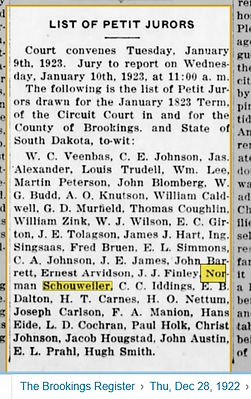Pvt. Norman Schouweiler
February 12, 1897 - June 21, 1986
Battery C 147th Field Artillery
Norman Schouweiler
Norman Schouweiler was born in Elkton, SD to Nicholas and Maude Schouweiler and was the second born to their six children. Norman received his education in Brookings, SD and worked in farmer along with family. He attended Mankato College before joining the Army. He served in WWI with Battery C of the 147 Field Artillery unit.
After his service to the country, he worked in the courthouse in Brookings, SD as a clerk. He later went into business with his father in the mercantile store in White, SD. On May 24, 1921, he married Kathryn Gazeley and they resided in White. Their marriage produced three children; Douglas, Arthur, and JoAnn. In 1982 they moved to Brookings.
Norman passed away on June 21, 1986 - three years after his wife - and they are both interred at the Fairview Cemetery, White, SD.
Battery C of the 147th Field Artillery Unit
The 147th Field Artillery Regiment is a field artillery parent regiment under the United States Army Regimental System, part of the South Dakota Army National Guard, that has one battalion on active duty, the 1st Battalion, 147th Field Artillery, part of the 115th Field Artillery Brigade. The regiment traces its lineage to the militia of the Dakota Territory, being first organized as an infantry unit in 1884. The regiment has battle credits for the Philippine Insurrection, World War I, World War II, and the Global War on Terrorism.
https://en.wikipedia.org/wiki/147th_Field_Artillery_Regiment


Petit Juror
In common law, a petit jury (or trial jury; pronounced /ˈpɛtət/ or /pəˈtiːt/, depending on the jurisdiction) hears the evidence in a trial as presented by both the plaintiff (petitioner) and the defendant (respondent). After hearing the evidence and often jury instructions from the judge, the group retires for deliberation, to consider a verdict. The majority required for a verdict varies. In some cases it must be unanimous, while in other jurisdictions it may be a majority or super majority. A jury that is unable to come to a verdict is referred to as a hung jury. The size of the jury varies; in criminal cases involving serious felonies there are usually 12 jurors, in civil cases many trials require fewer than twelve jurors. Juries are almost never used in civil cases outside the United States and Canada. Other states with a common law tradition sometimes use them in defamation cases, in cases involving a governmental eminent domain power, and in cases involving alleged wrongful conviction. Civil juries are available in the United States and Canada in almost all cases where the only remedy sought is money damages.






